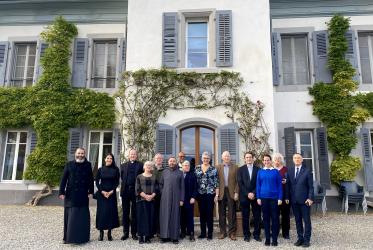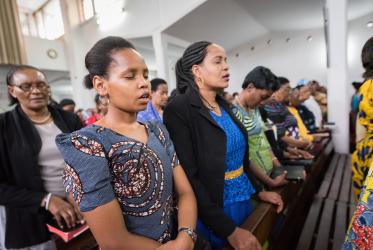Panel at Taiwan Theological College and Seminary (TTCS)
24 November 2006
Rev. Dr Samuel Kobia
General Secretary
World Council of Churches
Dear colleagues and friends, sisters and brothers in Christ,
For the title, you gave me the choice between "spirituality" or "spiritual formation". I have opted for the second version. If you have not tried it yet, just type "spirituality" in an internet search engine and you will get more than 83 Million entries!! The term spirituality is used in such a variety of ways and covers so many different expressions and understandings that it has become almost meaningless. Of course, we can define it as "a way of life formed and informed by the Holy Spirit", but then we are already close to "spiritual formation" as a constant task of our lives as disciples of Christ.
You rightly highlight the interactive relationships between spiritual formation and social concern. There is, of course, the Neo-Lutheran Two-Kingdom-Approach that is almost separating these dimensions of our faith and all too often we had to hear the church should refrain from politics, especially when politicians were afraid of the prophetic voice of the churches. But in situations like the church struggle in fascist Germany by the Confessing Church or the anti-apartheid struggle in South Africa by the South African Council of Churches and its members, it becomes crystal clear that the faith we confess in church, and that is the basis of our prayer, also compels us to give a clear witness to the love of God in all realms of our lives.
Our Christian faith is deeply spiritual and practical. The Christ whose presence we celebrate in the Eucharist is the same who is among us in the least of our sisters and brothers. The liturgy we celebrate in church extends into the liturgy of our daily lives. Our Orthodox friends call this link between the sharing in the Eucharist and the sharing of our lives the "liturgy after the liturgy".
This applies, of course, also to the ecumenical dimension of our faith. The way we live our faith as churches ecumenically informs our common witness just as our failure to act together and to give a clear witness to the world reflects our failure of being church. Ecumenism cannot be separated into spiritual or justice-oriented ecumenism, nor into church-based or world-open ecumenism. These different aspects belong together just like the Chinese Ying and Yang.
This insight must inform ecumenical and faith formation in the education of pastors and church workers. The curriculum of a theological seminary as a whole and of the individual models must reflect our commitment to God who calls us to unity, common commitment and costly discipleship. There should not be a course on ecclesiology that neglects the ethical challenges, or a course on ethics that does not reflect what it means to be church together. There should not be a course on church history that neglects the political and social context, etc.
I hope that these very brief reflections provide some basis for discussion. I will appreciate it if we could share our concrete experiences and/or examples of spiritual formation.
Appendix: The ecclesiology and ethics study
The WCC has explored this interactive relationship between the being and the acting of the church in the Ecclesiology and Ethics Study1. The first consultation in the study in 1992 in Roende stated that
"the community of disciples .is the bearer of the tradition and the form and matrix of moral life...Koinonia in relation to ethic does not mean in the first instance that the Christian community designs codes and rules; rather that it is a place where, along with the confession of faith and the celebration of the sacraments, and as an inseparable part of it, the Gospel tradition is probed permanently for moral inspiration and insight, and where incessant moral counsel keeps the issues of humanity and world alive in the light of the Gospel."2
This insight was duly expressed in the affirmation which laid the ground for the study:
"the church not only has, but is, a social ethic, a koinonia ethic."3 Responding to the focus on the fellowship of churches as koinonia in Faith and Order, the Roende report understood and interpreted this fellowship as "moral community" which necessarily wrestles with issues of "moral formation" and ethical discernment in the whole life of the church4. Christian moral life is conceived as the practice of liturgical existence, a continuous worship of the triune God (cf. Eph. 5,19-20), and understanding ethics as a liturgy after the liturgy' thus makes ecclesiology inseparable from ethics."5
The Tantur consultation that followed in 1995 was unique in its emphasis on ecumenical ethical reflection and action of the churches together as intrinsic to the church. The report asked:
"Is it enough to say that ethical engagement is intrinsic to the church as church? Is it enough to say that, if a church is not engaging responsibly with the ethical issues of its day, it is not being fully church? Must we not also say: if the churches are not engaging these ethical issues together, then none of them individually is being fully church?"6
Such an affirmation required further reflection on the ecumenical movement itself as a moral community, a shared space shaped as the gospel resonates across the divisions of confession, space and time. The third consultation in the series in 1996 in Johannesburg looked at the fellowship of churches in the WCC as such an ecumenical space that provides the opportunity for the churches to explore and test common doctrinal and moral discourse in moving beyond their own boundaries and encountering each other on the common pilgrimage to the goal of the visible unity of the church.
The Johannesburg report portrays the WCC as a koinonia that is on the one hand marked by its growing agreement on matters of faith and church and by its common ethical commitments and on the other hand functions as a common platform for challenging conversations on divisive theological, ethical, cultural and social concerns that cannot be solved by majority decision, but need careful processes of deliberation in full respect for difference and diversity of cultures and convictions. It describes the WCC's task as a "marker and space maker":
"where language is constantly sought to express the reality more fully, where common actions are conceived which embody the needed moral witness, and where an ecumenical formation takes place which gives growing density, increasing fullness, to it."7
The WCC is indeed in a very special position to do this kind of ecumenical moral formation in comparison with the United Nations (UN) or other international organisations and groups. Even the World Social Forum that somehow became the first secular equivalent to the ecumenical movement in its early days is very different in character. The WCC combines in a unique way elements of a movement and also of an institution holding together churches that provide a thick moral environment embedded in their respective life-worlds.8
The United Nations have by their very nature as a political organisation of member states channelled and tamed the challenges arising out of cross-cultural and cross-religious encounters in an increasingly interdependent but also asymmetrically structured international arena. The UN operates within the logic of the political system while the WCC is oscillating between institutional requirements of a global organisation and the encounter of diverse actors with deep roots in their life-worlds. The churches themselves are the primary agents of the search for common ground within the fellowship of the WCC.
This makes the WCC a precious laboratory for an emerging Christian global ethics in exchange and inter-action with different cultures and religions.
1 Ecclesiology and Ethics, eds. Thomas Best, Martin Robra, (Geneva: WCC, 1997)
2 Thomas Best, Martin Robra (eds), ibid. p. 9
3 ibid. p. 5
4 ibid. p. 10
5 Anna Marie Aagaard, Suggestions for Reflection, lecture at the Seminar on Methodologies in Approaching Social and Ethical Issues in October 2003 in Morges, p 2 - see also Anna Marie Aagaard, "The Church, the Churches, the Orthodox Churches, and the World Council of Churches. Notes on Eccelsiology and Ethics' in Conciliar Debate", ed. Else Marie Wiberg Pedersen, Holger Lam, and Peter Lodberg, For All People.Global Theologies in Contexts, (Grand Rapids: Wm. B. Eerdmans Publication Co., 2002), p 163; the seminar was organised in co-operation between the World Council of Churches and the Russian Orthodox Church.
6 Thomas F. Best, Martin Robra (eds.) ibid. p. 29
7 ibid. p. 81 and 82
8 for a comparison between the WCC and the UN in light of the theory of Jürgen Habermas' theory of communicative action cf. Martin Robra, Ökumenische Sozialethik, (Gütersloh: Gütersloher Verlagshaus 1994)




